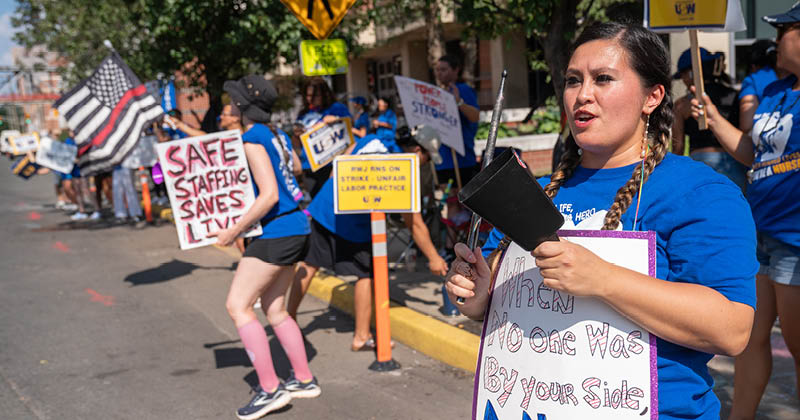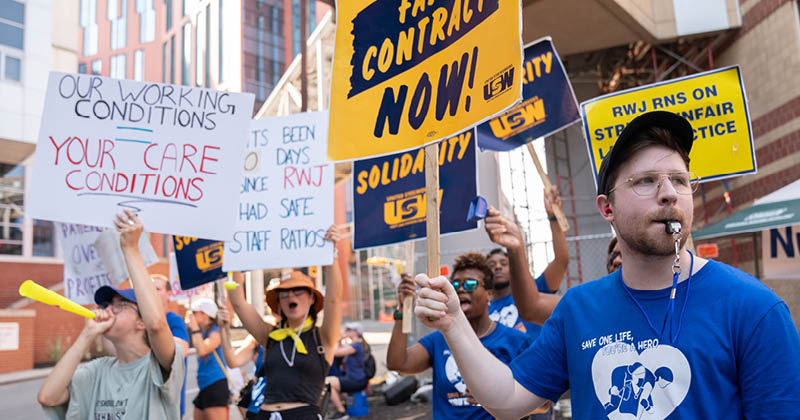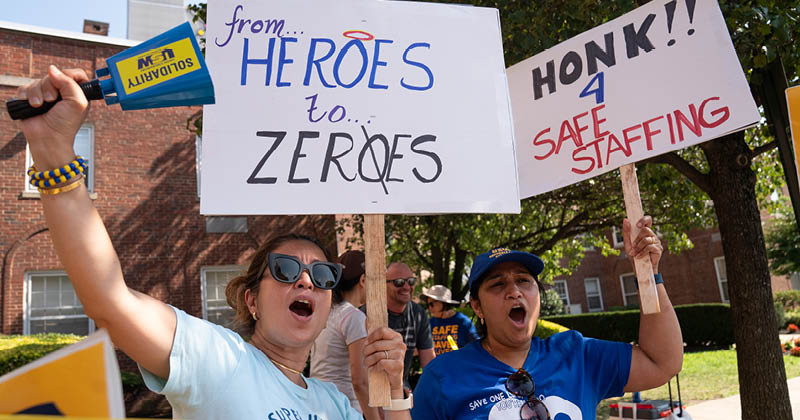Nurses Win Staffing Fight: Members Overwhelmingly Approve Contract to End Strike, Raise Standards at RWJ Hospital

Nurses who work at Robert Wood Johnson University Hospital in New Jersey voted overwhelmingly in December to ratify a new contract that ended a four-month unfair labor practice strike and established staffing standards to protect workers and patients.
Local 4-200 President Judy Danella credited the solidarity of the local union’s 1,700 members, as well as the support of other union members and the New Brunswick community, with helping to bring about the groundbreaking agreement that ended the nurses’ unfair labor practice strike.
“This contract would not have been possible if the nurses hadn’t stood together and demanded what our patients deserve,” said Danella. “This campaign has always been about safety and quality care, and we are ready to get back to work doing what we love.”
Return to Work
Nurses began returning to work in early January under new staffing rules and enforcement mechanisms to help ensure that the hospital maintains safe nurse-to-patient levels, as well as infrastructure to facilitate greater communication between front-line nurses and the hospital administration.
“We are very excited to go back to work with those rules,” Danella said. “It’s a start. We are the only contract that I know of in the state of New Jersey with these staffing ratios.”

Under the agreement, the hospital also will add 70 registered nurse positions, effective May 1, 2024. Those positions will be a mixture of full-time and part-time employees.
“We are particularly proud that this contract includes accountability and communication, which will ensure that staffing will remain a top priority moving forward,” Danella said.
International Visit
The nurses got a lift in their fight from workers across the world. In late August, USW members who were attending the Congress of UNI Global Union in Philadelphia led a delegation of 38 workers from 16 countries to join the Local 4-200 picket line.
In addition, the RWJ nurses received strong support from their fellow USW members across the country as well as workers in their own backyard. Students and unionized faculty members at Rutgers University offered continuous support, as did members of the New York State Nurses Association (NYSNA), which includes workers who live just a short drive or train ride from the RWJ New Brunswick facility.

“We should not have to strike to win common sense solutions to protect our patients and communities,” said Nancy Hagans NYSNA president. “It is the responsibility of our government to enact policies that will protect us.”
New York nurses successfully pushed their state legislators to enact such policies, which went into effect in January 2023. Members of Local 4-200 have long been advocating for New Jersey to adopt similar safe staffing rules.
Staffing Fight
Last spring, before the strike began, USW members joined hundreds of other health care workers for a large rally in Trenton urging state lawmakers to pass measures similar to the New York law.
“Quite simply, safe staffing is good for patients and good for workers,” said International Vice President Kevin Mapp, who oversees the USW’s health care sector, which includes more than 50,000 workers across North America. “Health care workers put themselves on the line every day because they love what they do. Safe staffing improves patient outcomes and reduces burnout and turnover for nurses.”
Danella promised that, following the victory at RWJ, the fight would continue for safe staffing across New Jersey and the United States.
“Now we’ll take safe staffing to the next level,” she said. “We will continue to try to get the state of New Jersey to pass the safe staffing bill.”
As the strike neared the three-month mark in late October, USW members and other health care workers packed a nearby Rutgers University auditorium as U.S. Sen. Bernie Sanders of Vermont led a Senate committee hearing on safe hospital staffing.
“Nurses at Robert Wood Johnson and workers all over this country want better wages and better benefits, but that is not the primary reason for the strike,” said Sanders, chair of the Senate Committee on Health, Education, Labor and Pensions. “What nurses have told me, and I’ve had the opportunity on several occasions to sit down and talk with these nurses, is that what this strike has everything to do with is the safety of their patients.”
Strong Contract
In addition to delivering on the nurses’ safe staffing priorities, the new three-year agreement includes annual wage increases, limits health care costs and boosts retirement benefits.
Though the fight was a difficult one for members, it also brought them together like never before, Danella said.

“People that you would never know, people you met on the picket line, we formed little families along the way,” she said. “Some days, being on the picket line, it gave people the boost they needed to continue.”
Now, Local 4-200 will shift the fight for safe staffing from the picket lines in New Brunswick to the halls of New Jersey government.
“It just kind of started a movement,” Danella said. “It has been 20 years in the making, but I’m hopeful that it’s taken to the next level. Every nurse and every patient in the state of New Jersey deserves safe staffing.”
By clicking Sign Up you're confirming that you agree with our Terms and Conditions.
Recent News Articles
Want to Learn More?
See how the USW is making a real difference in our communities and our workplaces.
